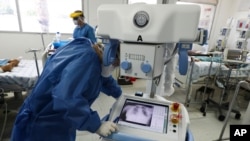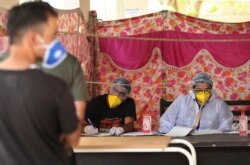The U.S. states of Arizona and Florida on Saturday reported single-day coronavirus infection records, highlighting the disease’s spread in several Southern and Western states. On Friday, the U.S. recorded its highest daily total of new cases for the third straight day.
Coronavirus cases are also surging in the south-central U.S. state of Texas, prompting the state’s governor, Greg Abbott, to express regret for having allowed bars to reopen prematurely.
“If I could go back and redo anything, it probably would have been to slow down the opening of bars, now seeing in the aftermath of how quickly the coronavirus spread in the bar setting," Abbott said in an interview Friday evening on KVIA television in El Paso.
Florida joined Texas in ordering bars to stop serving liquor on Friday.
Meanwhile, the global number of coronavirus infections continued to climb worldwide. Johns Hopkins University figures showed that as of Saturday afternoon EDT, there were nearly 9.9 million cases.
The U.S. continued to lead the world in the number of confirmed infections with more than 2.5 million, about one-quarter of all reported infections worldwide, according to Johns Hopkins. Brazil followed the U.S. with almost 1.3 million cases, while Russia was third with nearly 627,000.
Another record in India
A troubling rise in infections was also reported in India, where the Times of India said the South Asian nation had recorded 18,552 new COVID-19 cases Saturday, surpassing Friday’s record of 17,296.
And Indonesia reported its biggest daily increase in coronavirus infections with 1,385 new cases, taking the total to 52,812, a health ministry official said.
But Italy – one of the worst-hit countries early in the pandemic – appeared to be moving in the opposite direction. Officials on Saturday reported 175 new infections and just eight deaths, its lowest single-day total since March 1.
Elsewhere, the Australian state of Victoria recorded 41 new COVID-19 cases Saturday, marking 11 consecutive days of double-digit infection increases after the country appeared to have brought the contagion under control. Australia said it would continue to reopen its economy despite the rising number of infections in Victoria.
Possible travel bans
Meanwhile, European Union officials said travelers from the U.S., Russia and a number of other countries that have not reduced their COVID-19 infections would likely not be allowed into EU countries when the bloc reopens July 1.
In the United States, a federal judge has ordered President Donald Trump’s administration to release children held for more than 20 days and their parents from three family detention centers in Texas and Pennsylvania because of the coronavirus pandemic.
District Judge Dolly Gee wrote that the centers “are ‘on fire’ and there is no more time for half measures.”
The U.S. coronavirus task force held its first public briefing in nearly two months Friday; the president did not attend.
The World Health Organization said Friday that it needed more than $30 billion in the next year to develop and produce COVID-19 tests, vaccines and other treatments.
A WHO-led coalition focused on containing the spread of the coronavirus hopes to use the funds to speed efforts to assist low- and middle-income countries by the middle of next year.
Thai emergency
A coronavirus state of emergency in Thailand that critics maintain has been used to suppress political dissent may be extended next week. The nation’s Cabinet is scheduled to decide Tuesday on whether to extend it. The state of emergency empowers the government to censor the media, disperse gatherings and implement curfews.
Portugal said it was reinstating lockdown measures for about 700,000 people living around Lisbon after a rise in cases.
In Britain, Health Secretary Matt Hancock threatened to close beaches in the country if coronavirus cases rose after a heat wave led people to flock to the shores.
Wayne Lee, Fern Robinson and Megan Duzor contributed to this report.







